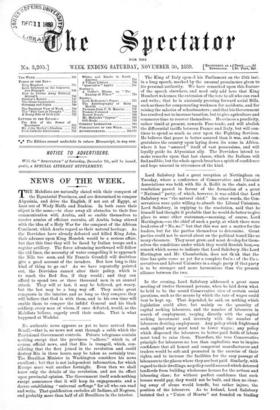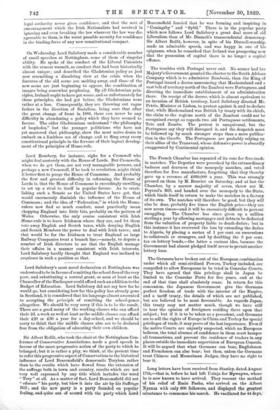In the evening, Lord Salisbury addressed a great mass meeting
of twelve thousand persons, when he laid down what he held to be the sound Conservative view of certain social questions, such as the means by which the rate of wages could best be kept up. That depended, he said, on nothing which legislation could alter, but mainly on the quantity of capital seeking labourers, and the number of labourers in search of employment, varying directly with the capital seeking investment and inversely with the number of labourers desiring employment. Any policy which frightened such capital away must tend to lower wages ; any policy which dispersed the labourers to better-paid fields of labour must tend to raise them. Therefore, the true Conservative principle for labourers no leas than capitalists, was to inspire confidence that all honest and competent manufacturers and traders would be safe and protected in the exercise of their rights, and to increase the facilities for the easy passage of labourers to the places where they are best paid. Similarly, with regard to their dwellings, no policy could succeed which deterred landlords from building wholesome houses for the artisan and labouring class; for without perfect confidence that such houses would pay, they would not be built, and then no clear- ing away of slums would benefit, but rather injure, the position of the labourers. As to Ireland, Lord Salisbury insisted that a "Union of Hearts" not founded on binding
legal authority never gives confidence, and that the sort of encouragement which the Irish Nationalists had received in ignoring and even breaking the law wherever the law was dis- agreeable to them, is the worst possible security for confidence in the binding force of any new constitutional compact.







































